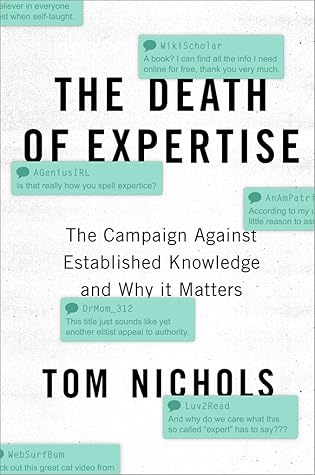More on this book
Community
Kindle Notes & Highlights
Read between
May 26 - May 31, 2020
American must engage in deep study of policy, but if citizens do not bother to gain basic literacy in the issues that affect their lives, they abdicate control over those issues whether they like it or not. And when voters lose control of these important decisions, they risk the hijacking of their democracy by ignorant demagogues, or the more quiet and gradual decay of their democratic institutions into authoritarian technocracy.
because these small schools cannot support a doctoral program in an established field, they construct esoteric interdisciplinary fields that exist only to create new credentials. It’s not hard to see how this ends up creating degrees that do not actually signal a corresponding level of knowledge. All of this borders on academic malpractice. The creation of graduate programs in colleges that can barely provide a reasonable undergraduate education cheats both graduates and undergrads. Small colleges do not have the resources—including the libraries, research facilities, and multiple programs—of
...more
To faculty everywhere, the lesson was obvious: the campus of a top university is not a place for intellectual exploration. It is a luxury home, rented for four to six years, nine months at a time, by children of the elite who may shout at faculty as if they’re berating clumsy maids in a colonial mansion.
Although the Internet could be making all of us smarter, it makes many of us stupider, because it’s not just a magnet for the curious. It’s a sinkhole for the gullible. It renders everyone an instant expert. You have a degree? Well, I did a Google search! Frank Bruni Do not believe everything you read on the Internet, especially quotes from famous people.
Nonetheless, books from reputable presses go through at least a basic process of negotiation between authors, editors, reviewers, and publishers, including the book you’re reading right now. Books from self-published “vanity presses,” by contrast, are looked down upon by reviewers and readers alike, and with good reason.
A 2014 Pew research study found that liberals are more likely than conservatives to block or unfriend people with whom they disagreed, but mostly because conservatives already tended to have fewer people with whom they disagreed in their online social circles in the first place. (Or as a Washington Post review of the study put it, conservatives have “lower
News organizations had to try to cover the broadest and most demographically marketable audience, and so newscasts in the United States through the 1960s and 1970s were remarkably alike, with calming, authoritative figures like Walter Cronkite and Harry Reasoner reporting even the most awful events with aplomb and detachment. However, this also meant that not everything counted as news.
We just have to be more responsive to what the audience wants. I think the tradition in newspapers has been that we have set the agenda and we’ve told readers what we think they want to know. I think we need to come down off of that mountain a little bit and ask people, involve people in the conversation a little bit more.8
Limbaugh, however, did something unique, by setting himself up as a source of truth in opposition to the rest of the America media. Within a few years of his first broadcasts, Limbaugh was heard on more than six hundred stations nationwide. He told his listeners that the press and the national television networks were conspiring in a liberal echo chamber, and especially that they were in the tank for the new administration of President Bill Clinton. Not all of these charges were entirely fair, but not all of them were wrong either, and Limbaugh was able to mine the established media daily for
...more
The calls were screened and vetted; according to a manager at one of Limbaugh’s early affiliates, this was because Limbaugh felt that he was not very good at debate. Debate, however, was not the point: the object was to create a sense of community among people who already were inclined to agree with each other. Later, the Internet would overtake this kind of network building among people who rejected the mainstream media, but the phenomenon began on radio. The
Experts face a difficult task in this respect, because no matter how many times scholars might emphasize that their goal is to explain the world rather than to predict discrete events, laypeople and policymakers prefer prediction. (And experts, even when they know better, often gladly oblige.)
As the philosopher Bertrand Russell wrote in a 1928 essay, laypeople must evaluate expert claims by exercising their own careful logic as well. The skepticism that I advocate amounts only to this: (1) that when the experts are agreed, the opposite opinion cannot be held to be certain; (2) that when they are not agreed, no opinion can be regarded as certain by a non-expert; and (3) that when they all hold that no sufficient grounds for a positive opinion exist, the ordinary man would do well to suspend his judgment.
The relationship between experts and citizens, like almost all relationships in a democracy, is built on trust. When that trust collapses, experts and laypeople become warring factions. And when that happens, democracy itself can enter a death spiral that presents an immediate danger of decay either into rule by the mob or toward elitist technocracy. Both are authoritarian outcomes, and both threaten the United States today. This is why the collapse of the relationship between experts and citizens is a dysfunction of democracy itself.


